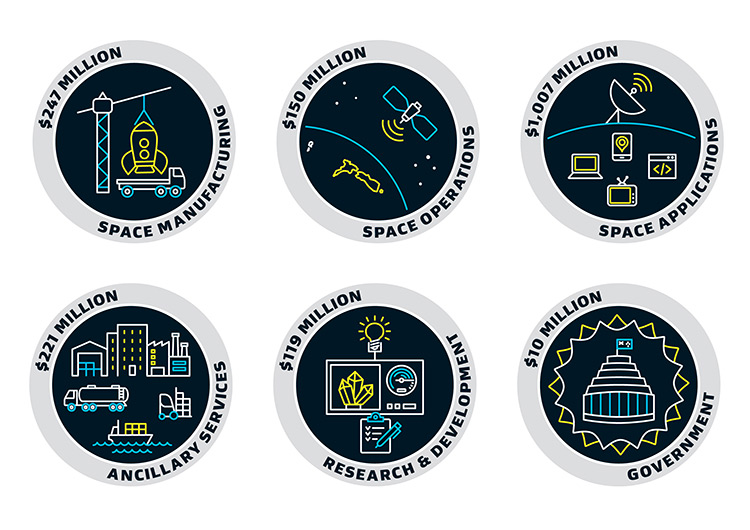Careers in space
Astronauts may be the most well-known space workers, but there’s a wide range of opportunities available for a space career! Space is complex and requires workers with a variety of skills across science, engineering, technology, and more, including areas like communications and law.
Keep reading to find out how your space career could take off.
On this page

New Zealand may be a small country but we’re a big player when it comes to space. A recent report by Deloitte found that the New Zealand space industry was worth $1.75bn in 2018/19, directly employed 5,000 people and indirectly supported a further 7,000 jobs.
Deloitte report(external link) — beehive.govt.nz
It’s a sector that’s growing fast and needs people with all sorts of skills to work in all sorts of areas that you may not even associate with space. In fact you may end up in a job that doesn’t even exist right now, but if you’re flexible and ready to take on a challenge there’s no limit to where space could take you.
How space contributes to the New Zealand economy

Estimated space revenue across sub-sectors from 2018-19.
Source: Deloitte Access Economics
Image description
Where to start?
Find out how today's experts got into their current roles:
Working in the space sector(external link) — Science Learning Hub
Webinar about space career pathways:
Space careers pathway webinar video(external link) — Sort It
What to study at school
Keep up your Science, Technology, Engineering and Mathematics (STEM) subjects
Success in STEM subjects provides better options for study and employment in most space careers. STEM subjects form the basis for many careers that require innovation and problem-solving skills. Studying STEM encourages you to experiment and learn from real life experiences.
Try entering school competitions that will help develop your STEM skills, such as the Design a Satellite Mission essay competition. Participate in initiatives like The Wonder Project or explore resources from the Science Learning Hub. These are designed to inspire young Kiwis like you in STEM.
School programmes
There are other pathways available too. Space law is set to be a complex and necessary field in coming years, while studying space science more generally can provide in depth and tailored experience in the field.
What to study after school
Many space careers require a degree or some sort of apprenticeship to get you started. Below are some degree/apprenticeship options, but check out the universities for their full range of offerings.
Once you start studying you will be able to decide what to specialise in to get into the type of work you really want to do.
When you imagine your future what do you see yourself doing?
Rockets, spaceplanes and satellites
Space systems and data
Celestial bodies, planets and stars
Space law, security and international relations
Origins of planets
Planetary defence
Plant life in space
Space medicine
Space science
Other opportunities
Space industry apprenticeships and internships
Rocket Lab offers apprenticeship positions for high school leavers and technicians in New Zealand wanting to gain on-the-job qualifications. These are posted on the Rocket Lab careers website as they become available and have various entry requirements. To find out more email careers@rocketlab.co.nz
Dawn Aerospace take on summer interns and work in collaboration with a range of universities to support final year (Honours) and master's students. To find out more email careers@dawnaerospace.com
The New Zealand Space Agency offers an internship in partnership with the NASA Jet Propulsion Lab (JPL) via our scholarships programme. The scholarship aims to support New Zealand students in space related activities.
NASA internships and New Zealand Space Agency scholarships
International opportunities
The International Space Institute specialises in providing graduate level training to the future leaders of the emerging global space community at its Central Campus in Strasbourg, France and at locations around the world, including a 5-week Southern Hemisphere Space Studies Program.
Space education(external link) — International Space University
Southern hemisphere space studies program(external link) — International Space University
Do you dream of going to space? In 2021 Haritina Mogosanu applied to be an astronaut at the European Space Agency (ESA).
Disclaimer
This page lists only a few of the courses you might like to explore. There are many more on offer at universities throughout New Zealand. We endeavour to keep this content current, but as the information about these courses belong to third parties, we cannot guarantee it will not change. For the most up to date information on what is available, check the university websites. These courses are not a guaranteed or endorsed pathway to a space career. The New Zealand Space Agency and MBIE do not endorse any particular course, university or organisation listed on this web page.
If you represent a university (or other institution) with space-related courses that you’d like to add to these pages, please email us:

